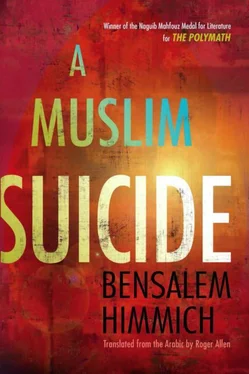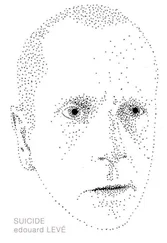One day in the following year, I was rushed at noon to Governor Abu Numa's palace, with the urgent request that I treat the wounds that he had received during a surprise raid by some Bedouin in the desert outside Mecca. When I reached his bed and checked on his condition, I found that he was almost unconscious. His face was covered with bruises, making clear to me that he had some minor fractures at the front and back of his skull. I began my treatment by cleaning him up with water and powder. When he came round, blinked his eyelids, and started breathing a bit more normally, I asked the servants to bring me some materials that I specified. I made a gypsum cast and placed it on his bald head, my hope being that after a while it would help the bones to reknit. That done, I decided to return to my residence, but I instructed the chamberlain that it was essential that his master have complete rest for seven whole days.
How can I possibly avoid expressing my admiration for the way Abu Numa behaved so modestly with people and took good care of the poor and sick, not to mention the way he insisted on giving them a model of behavior by showing bravery and initiative in conflict? Such a leader certainly has no comparable figure in Andalus today, which is ruled by pathetic cowards?
A week later I decided to go back to the palace and check on his condition. He received me in his council chamber at once, and with a warmth that drew the attention of his chamberlain and aides. He started expressing his enormous gratitude to me, while I accepted his words with what I hoped was the appropriate level of humility. He pointed to the cast on his head.
"So, holy man of God," he said with a smile, "I've done nothing for a week as you advised. When are you going to rid me of this helmet?"
"Not until it's done its work and I've checked on you, Sir," I replied. "I'd say, a least a month."
"A month or more! No, my brother, please take pity on me, and bear in mind the number of responsibilities I have."
"There's nothing to stop you working, provided that you support the cast with a turban or hat of some kind. You will still need to avoid any situation that involves tension, worry, riding horses, and fighting."
The governor looked down for a moment, then asked his retinue to leave.
"What you advise is obviously the wise thing to do," he said. "May God never disable your right hand! Your counsel is worth more to me than refined gold. I do wish you would give me your advice on other things too; at the top of the list, religion, politics, and strategy. So now Baghdad has been destroyed by the Mongols, and the Abbasid caliphate is breathing its last. If we decide to ally ourselves with the Mamluks as a way of getting rid of the Tatar menace, are we liable to be moving out of the frying pan into the fire? Or, beloved of God, do you have some other way of looking at it?"
I got the clear impression that the governor knew the correct answer full well, but his question was a way of testing my knowledge of politics and recent events.
"May God support you with His knowledge, Sir," I replied. "The steel of Mamluk power is the only force that is able to confront the Mongols. Their leader, Al-Muzaffar Sayf al-Din Qutuz,* and his peer, General Al-Zahir Rukn alDin Baybars,* have given us sufficient evidence of their ability to defend Islam's interests and territories. In that way, they are the contemporary replica of the Seljuk* and Ayyubid forces in times past. If we are to confront the dangers posed by Hulagu Khan and his hordes, we have no choice but to rely on the Mamluks. Quite apart from the basic logic of that decision, the entire matter rests on the principle that any decision has to be based on what is reckoned the most appropriate, that being a governing principle even when the person involved is a manumitted slave. The same thought occurs in the sermon that Muhammad, our Prophet-prayers and blessings upon him-delivered on his farewell pilgrimage [632 CE]: `No Arabic speaker has precedence over a non-Arabic speaker; no white person has precedence over a black. Precedence can only be based on belief in God.' There are many similar references to be found in the Qur'an, the text of all texts, and in other source works."
I noticed that my interlocutor was looking very tired. Suggesting that he needed to pray and get some rest, I asked his permission to leave and departed with expressions of support and prayers for his continuing recovery.
Just before the end of the first week of Rajab, Yasir the warden handed me a letter from my beloved friend Al-Shushtari, which he in turn had received from a Fez merchant on his way to the Hijaz and Syria. After reading it, I felt relieved and happy. The writer was able to reassure me about the health and safety of my wife and Hamada, who were both in Tangier. Al-Shushtari told me that he himself hoped to be with me, God willing, fairly soon. That afternoon, just after the prayer, I received a visit from Sitt Umama, accompanied by the warden. I shared with them my delight at the news in the letter I had received, and they both shared my feelings and blessed my good fortune. My servant, Ghaylan, meanwhile, was making it his job to provide our table with all kinds of food and drink. I asked the lady how she was feeling, and she replied that, thank God, she was well, almost as if the contagion of my own happiness and well-being had spread to her as well. We then started a discussion of divine love as seen by Rabi'a al'Adawiyya, and of self-obliteration and permanence in the career of Al-Hallaj. As the hour for sunset prayer drew close, she bade me farewell, much affected by our discussion. I hurried to the sacred enclosure to do my ablutions and pray.
One Monday morning at the start of Sha`ban, I went to Abu Numa's palace at his request. He bid me a profuse welcome. No sooner had I joined him at a table loaded with food than he pointed pleadingly at the plaster cast on his head.
I decided to tease him a bit. "It should probably stay on for another month, Sir," I said with a smile, "so that the cast can bear fruit…"
"Bear fruit, you say!" he interrupted me in alarm. "No, Ibn Dara, that's not what you should be saying. Rather, so the lice can build a nest in what's left of my hair!"
"Good news, then!" I replied. "With God's help, it's release that's coming, not lice!"
I indicated to him to lie down on his bench. I ordered a servant to bring some liquids that I specified. I then tried, ever so gently, to get the cast off, but without success. I whispered in the governor's ear as he lay there that his crown was refusing to break its vow of loyalty to its master.
"Then tell it to start a rebellion!" he joked back.
With that I moistened the edges with warmer water till it felt soft and malleable. I removed it ever so slowly and started rubbing the entire skull with cotton swabs dipped in ether. The fractures had clearly healed completely. I put some caster oil on his head and pressed down, but the governor showed no signs of pain whatsoever. With that, I told him that he was fully cured, whereupon he embraced me and offered me profuse thanks. He now sat up and took a deep breath. One servant proceeded to spray us both with perfumed water, while another filled a brazier with aromatic wood.
"Now, my savior and physician," he said, "pray to God to give me the strength to run the city's affairs properly and to solve issues that are still pending. About a month ago, when you spoke to me about the two Mamluk leaders, Qutuz and Baybars, and praised their prowess, their army had already advanced into Palestine and amassed at 'Ayn Jalut* in the Nablus desert region. Were you aware of that?"
I shook my head. "How could I possibly know that," I asked in amazement, "when my purpose in coming to Mecca was entirely devotional? I have absolutely no involvement whatsoever in politics, let alone military matters!"
Читать дальше












